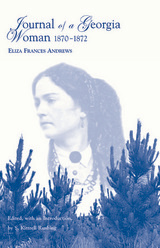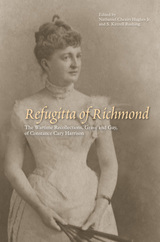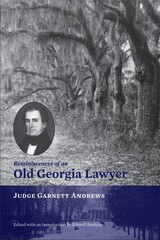
Andrews was an intelligent, sharp-witted, and skilled observer, and these qualities shine through her engaging memoir. She records her reactions to Newark society and the economic base on which it stood, comparing southern gentility and agriculture to northern brusqueness and industry. Moreover, while the diary reveals clearly the social and cultural attitudes of aristocratic southerners of the period, it also foreshadows the beginning of change as, for example, a visit to a factory opens Andrews’s eyes to the advantages of the new economy. She also recounts her frustrations with the role of southern women, exalted on the one hand but severely restricted on the other. These stark contrasts and Andrews’s own mixed feelings give the diary much of its power.
Also included in this volume are six of Andrews’s magazine and newspaper articles that appeared in the national press around the time she was keeping this journal. Taken together, her private and public writings from this period show a maturing nineteenth-century woman confronting a culture turned upside down in the new world of the Reconstruction-era South.
Andrews’s memoir, with accompanying introduction and commentary by Kit Rushing, will appeal to general readers with an interest in the nineteenth-century South as well as to historians of women, the Civil War era, and nineteenth-century America.
The Editor: S. Kittrell Rushing is head of the Department of Journalism and Mass Communication at the University of Tennessee, Chattanooga.

In the expansive canon of Civil War memoirs, relatively few accounts from women exist. Among the most engaging and informative of these rare female perspectives is Constance Cary Harrison’s Recollections Grave and Gay, a lively, first-person account of the collapse of the Confederacy by the wife of President Jefferson Davis’s private secretary. Although equal in literary merit to the well-known and widely available diaries of Mary Boykin Chesnut and Eliza Frances Andrews, Harrison’s memoir failed to remain in print after its original publication in 1916 and, as a result, has been lost to all but the most diligent researcher. In Refugitta of Richmond, Nathaniel Cheairs Hughes Jr. and S. Kittrell Rushing resurrect Harrison’s work, reintroducing an especially insightful perspective on the Southern high command, the home front, and the Confederate elite.
Born into an old, aristocratic Virginia family in 1843, Constance Cary fled with her family from their estate near Alexandria, Virginia, to Richmond in 1862. There, the nineteen-year-old met Burton Norvell Harrison, a young math professor from the University of Mississippi who had come to the Confederate capital to work for Davis. The pair soon became engaged and joined the inner circle of military, political, and social leaders at the Confederate White House. Under the pen name “Refugitta,” Constance also wrote newspaper columns about the war and became a respected member of Richmond’s literary community.
Fifty years later, Constance used her wartime diaries and letters to pen her recollections of her years in Richmond and of the confusing months immediately after the war. She offers lucid, insightful, and detailed observations of the Confederate home front even as she reflects on the racial and class biases characteristic of her time and station. With an informative introduction and thorough annotations by Hughes and Rushing, Refugitta of Richmond provides a highly readable, often amusing, occasionally troubling insider’s look at the Confederate nerve center and its ultimate demise.
Nathaniel Cheairs Hughes Jr. is the author or editor of twenty books relating to the American Civil War, including The Life and Wars of Gideon J. Pillow; Brigadier General Tyree H. Bell, C.S.A.: Forrest’s Fighting Lieutenant; and Yale’s Confederates.
S. Kittrell Rushing, Frank McDonald Professor of History at the University of Tennessee at Chattanooga, is the editor of Eliza Frances Andrews’s A Family Secret and Journal of a Georgia Woman, 1870–1872. Rushing also edited and annotated Judge Garnett Andrews’s Reminiscences of an Old Georgia Lawyer.

The old judge enjoyed swapping tales and sharing company with other lawyers, politicians, and family members. A true aristocrat of the Old South, Garnett Andrews (1798–1873) so enjoyed hearing and telling good yarns that he decided late in his life to preserve them for posterity. The judge wrote down a collection of his stories, including tales of men with whom he had worked—and some whom he had worked against—and in 1870, about three years before he died, he had his booklet printed and circulated among friends. He titled it Reminiscences of an Old Georgia Lawyer.
This new volume reprises Andrews’s work, and features a new introduction by S. Kittrell Rushing. In recounting a lawyer’s life from the frontier period through the Civil War and into the Reconstruction era, Andrews’s recollections provide rare and fascinating details, particularly about pre–Civil War Georgia, the state of the judiciary in the early national period—about which little has been written—and the larger political and social milieu of antebellum and postbellum America. This is an eclectic mixture of tall tales, humorous anecdotes, and keen observations about southern society and the practice of law.
In his introduction, Rushing places Andrews’s writings in a broad context. He addresses Andrews’s racial views head on, confronting and probing the racism, sexism, and classism of Andrews and his times. In addition, Rushing provides biographical and genealogical information about the judge and his family, including his daughter, the noted diarist and novelist Eliza Frances Andrews. This volume also includes other pieces by Andrews, among them letters, speeches, and his acceptance of the 1855 gubernatorial nomination.
Highly readable and lively, Reminiscence of an Old Georgia Lawyer will enlighten and entertain both scholars and general readers interested in the history of Georgia, the Old South, and American legal history.
READERS
Browse our collection.
PUBLISHERS
See BiblioVault's publisher services.
STUDENT SERVICES
Files for college accessibility offices.
UChicago Accessibility Resources
home | accessibility | search | about | contact us
BiblioVault ® 2001 - 2024
The University of Chicago Press









